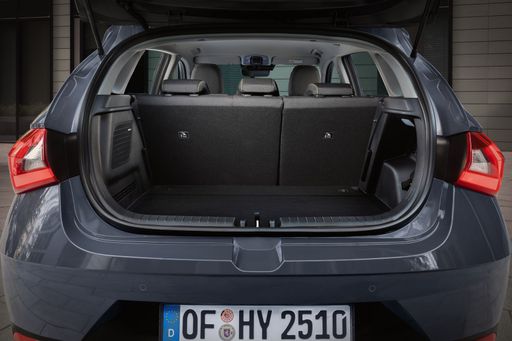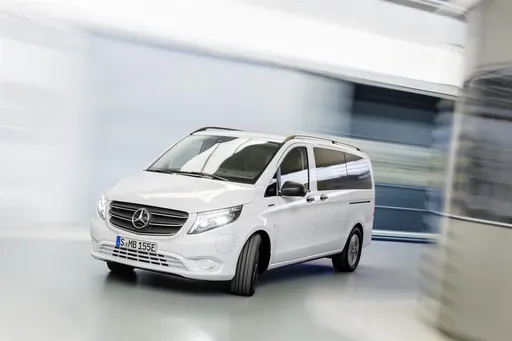Hyundai i20 vs Mercedes Vito Bus – Differences & prices compared
Compare performance, boot space, consumption and price in one view.
Find out now: which car is the better choice for you – Hyundai i20 or Mercedes Vito Bus?
The Hyundai i20 (Hatchback) comes with a Petrol MHEV or Petrol engine and Automatic or Manuel transmission. In comparison, the Mercedes Vito Bus (Bus) features a Diesel, Electric or Petrol engine with Automatic transmission.
When it comes to boot capacity, the Hyundai i20 offers 352 L, while the Mercedes Vito Bus provides 1390 L – depending on how much space you need. If you’re looking for more power, decide whether the 100 HP of the Hyundai i20 or the 237 HP of the Mercedes Vito Bus suits your needs better.
In terms of consumption, the values are 5.20 L per 100 km for the Hyundai i20, and 26.70 kWh6.70 L for the Mercedes Vito Bus.
Price-wise, the Hyundai i20 starts at 17400 £, while the Mercedes Vito Bus is available from 36300 £. Compare all the details and find out which model fits your lifestyle best!
Hyundai i20
The Hyundai i20 impresses with its sleek design and modern aesthetics, making it a stylish choice in the compact car segment. Its interior is thoughtfully designed, offering comfort and advanced technology for a pleasurable driving experience. The vehicle also stands out with its efficient performance and agile handling, making city driving a breeze.
details @ hyundai.news
@ hyundai.news
 @ hyundai.news
@ hyundai.news
 @ hyundai.news
@ hyundai.news
 @ hyundai.news
@ hyundai.news
 @ hyundai.news
@ hyundai.news
Mercedes Vito Bus
The Mercedes-Benz Vito Bus offers a versatile solution for those in need of spacious and comfortable group transportation. Its refined interior is designed to enhance passenger comfort, making it ideal for both business and leisure travel. With a focus on safety and efficiency, it provides a reliable driving experience that aligns with the high standards expected of the Mercedes-Benz brand.
details

|

|
|
|
|
Costs and Consumption |
|
|---|---|
|
Price
17400 - 24000 £
|
Price
36300 - 55000 £
|
|
Consumption L/100km
5.2 - 5.3 L
|
Consumption L/100km
6.7 - 10 L
|
|
Consumption kWh/100km
-
|
Consumption kWh/100km
26.7 - 26.9 kWh
|
|
Electric Range
-
|
Electric Range
248 - 370 km
|
|
Battery Capacity
-
|
Battery Capacity
60 - 90 kWh
|
|
co2
119 - 121 g/km
|
co2
0 - 228 g/km
|
|
Fuel tank capacity
40 L
|
Fuel tank capacity
57 - 70 L
|
Dimensions and Body |
|
|---|---|
|
Body Type
Hatchback
|
Body Type
Bus
|
|
Seats
5
|
Seats
8
|
|
Doors
5
|
Doors
4
|
|
Curb weight
1088 - 1190 kg
|
Curb weight
2023 - 2739 kg
|
|
Trunk capacity
352 L
|
Trunk capacity
580 - 1390 L
|
|
Length
4065 - 4075 mm
|
Length
4895 - 5370 mm
|
|
Width
1775 mm
|
Width
1928 mm
|
|
Height
1450 - 1455 mm
|
Height
1890 mm
|
|
Payload
450 - 472 kg
|
Payload
726 - 1077 kg
|
Engine and Performance |
|
|---|---|
|
Engine Type
Petrol MHEV, Petrol
|
Engine Type
Diesel, Electric, Petrol
|
|
Transmission
Automatic, Manuel
|
Transmission
Automatic
|
|
Transmission Detail
Dual-Clutch Automatic, Manual Gearbox
|
Transmission Detail
Automatic Gearbox
|
|
Drive Type
Front-Wheel Drive
|
Drive Type
Rear-Wheel Drive, All-Wheel Drive, Front-Wheel Drive
|
|
Power HP
79 - 100 HP
|
Power HP
136 - 237 HP
|
|
Acceleration 0-100km/h
11.1 - 13.7 s
|
Acceleration 0-100km/h
-
|
|
Max Speed
166 - 183 km/h
|
Max Speed
140 km/h
|
|
Torque
113 - 200 Nm
|
Torque
330 - 500 Nm
|
|
Number of Cylinders
3 - 4
|
Number of Cylinders
4
|
|
Power kW
58 - 74 kW
|
Power kW
100 - 174 kW
|
|
Engine capacity
998 - 1197 cm3
|
Engine capacity
1950 - 1999 cm3
|
General |
|
|---|---|
|
Model Year
2024
|
Model Year
2024
|
|
CO2 Efficiency Class
D
|
CO2 Efficiency Class
G, A
|
|
Brand
Hyundai
|
Brand
Mercedes-Benz
|
Hyundai i20
Introducing the Hyundai i20: A Blend of Style and Efficiency
The Hyundai i20 has been a favourite in the subcompact car segment, loved for its innovative features and reliable performance. In its latest versions, the i20 continues to impress with a perfect balance of aesthetics and functionality. Below, we dive into the technical details that make the Hyundai i20 a compelling choice for modern drivers.
Powertrain and Efficiency: Where Performance Meets Economy
The Hyundai i20 lineup offers an array of engine options, ranging from a 1.0-litre T-GDI petrol engine to the energetic 1.0-litre T-GDI 48V hybrid. These engines generate between 100 PS to a remarkable 204 PS in the N Performance variant. The incorporation of a mild-hybrid system improves fuel efficiency, with consumption as low as 5.1 L/100 km.
With both automatic and manual transmissions available, drivers can enjoy crisp gear shifts and a smooth driving experience. Front-wheel drive ensures nimble handling, making city and motorway drives equally enjoyable.
Design: Compact in Form, Grand in Appearance
The Hyundai i20 showcases a sleek hatchback design with dimensions that perfectly blend urban agility with interior spaciousness. Measuring between 4065 mm to 4075 mm in length, and with a width of 1775 mm, it offers a roomy cabin while maintaining a compact silhouette. The bold grille and stylish LED headlights contribute to its modern, athletic look.
Advanced Features and Technology
Innovation is at the heart of the Hyundai i20's appeal. It comes equipped with an impressive suite of technological features designed to enhance the driving experience. This includes a state-of-the-art infotainment system, which provides seamless connectivity through both Apple CarPlay and Android Auto.
The Hyundai SmartSense package is offered for peace of mind, with a suite of safety features like Forward Collision-Avoidance Assist and Lane Keeping Assist. These technologies ensure that you stay safe and in control, whether navigating city streets or hitting the open road.
Performance Variants: The Hyundai i20 N
For those who crave thrill, the i20 N variant doesn't disappoint. With 204 PS and a 6.2-second acceleration from 0 to 100 km/h, this hot hatch is designed for pure driving pleasure. It features an enhanced suspension setup and a range of performance-focused enhancements.
The i20 N embodies a spirit of adventure with its distinctive design cues and sporting credentials, perfect for enthusiasts who appreciate both performance and aesthetics.
Interior Comfort and Practicality
The interior of the Hyundai i20 is equally striking, with high-quality materials and a thoughtful layout that prioritises driver comfort and convenience. The cabin comfortably seats five passengers, while the boot offers a generous 352 litres of luggage space.
With an array of trim levels available, including N-Line and Prime, buyers can tailor the i20 to their tastes, ensuring they enjoy both luxury and practicality.
Final Thoughts: A Car Built for Modern Needs
The Hyundai i20 is more than just a car; it's a statement of style, efficiency, and innovation. Whether you're navigating busy urban streets or embarking on a road trip, the i20 is designed to meet the needs of contemporary drivers. With its range of engines, innovative features, and stylish design, the Hyundai i20 stands out in its class as a well-rounded and highly appealing choice.
Mercedes Vito Bus
The Mercedes Vito Bus: A Comprehensive Look at Innovation and Performance
In the automotive world, the Mercedes Vito Bus stands out as a versatile and reliable choice for those in need of a spacious and efficient mode of transport. With a reputation for engineering excellence, Mercedes-Benz has once again delivered with the latest versions of the Vito Bus. This article delves into the technical aspects, innovations, and what makes the Vito Bus a prime option in its segment.
Engine Power and Efficiency
The Mercedes Vito Bus offers a remarkable range of engine configurations, catering to both diesel and electric powertrains. The diesel models come with options ranging from 136 HP to a powerful 237 HP. The robust four-cylinder diesel engines are designed for efficiency, offering a range of fuel consumption figures from 6.7 L to 7.8 L per 100 kilometers, depending on the variant. Meanwhile, the electric eVito Tourer provides an impressive alternative with a power output of 204 HP and offers ranges of up to 371 kilometers on a single charge, making it a frontrunner in sustainable transportation solutions.
Transmission and Drivetrain Options
The Vito Bus is equipped with both manual and automatic transmission options, ensuring a drive tailored to user preferences. The 9G-TRONIC automatic gearbox is notable for its smooth transitions, enhancing the driving experience. Customers can choose between rear-wheel drive and the adaptable all-wheel drive system. The introduction of the eVito Tourer's front-wheel drive system further expands the versatility of the lineup, offering an electric alternative for urban and rural environments alike.
Interior Comfort and Practicality
The interior of the Vito Bus is designed with comfort and convenience in mind. Capable of seating up to eight passengers, the spacious cabin is ideal for family travel or business transportation. The Vito Bus offers three body lengths—kompakt, lang, and extralang—providing flexibility to accommodate different passenger and cargo requirements. The well-thought-out design ensures ample storage with trunk capacities ranging up to 1,390 liters in certain configurations.
Advanced Innovations
Mercedes-Benz has equipped the Vito Bus with a host of advanced technological features. The focus on safety is evident, with systems like Crosswind Assist and Attention Assist, ensuring greater control and alertness on the road. The eVito Tourer comes with the latest in electric vehicle technology, including efficient battery management systems that optimize range and performance.
Performance and Dynamics
The Vito Bus showcases impressive performance metrics across its variants. With a maximum torque ranging from 330 Nm to 500 Nm, the Vito Bus ensures a responsive and agile driving experience. The consistent build quality and dynamic chassis contribute to a pleasing ride, whether navigating city streets or cruising on the highway.
Conclusion
The Mercedes Vito Bus continues to be a leading choice for those looking for a reliable and performance-oriented vehicle. With its diverse range of engine options, innovative features, and versatile configurations, the Vito Bus meets the demands of both personal and professional transportation. The introduction of electric variants highlights Mercedes-Benz's commitment to sustainability without compromising on power or range. As the automotive industry continues to evolve, the Vito Bus exemplifies the blend of traditional excellence and forward-thinking innovation.
The prices and data displayed are estimates based on German list prices and may vary by country. This information is not legally binding.
